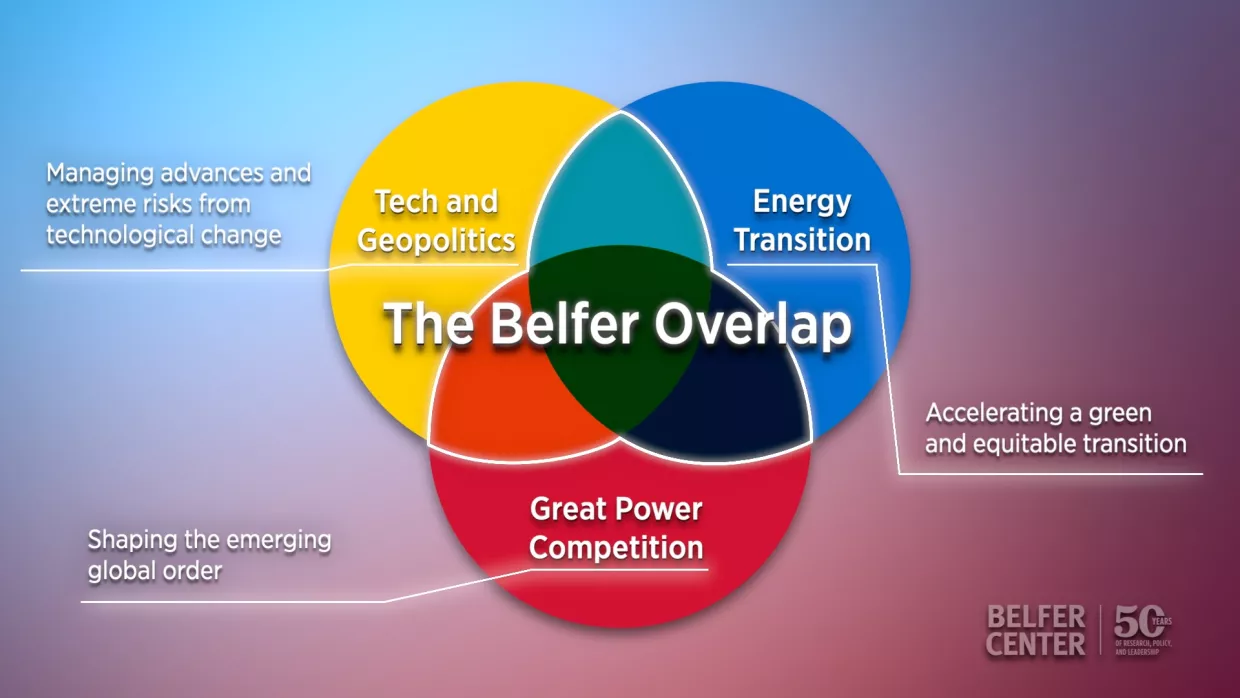I am pleased to reach out to you today for the first time as the Director of the Belfer Center for Science and International Affairs. This year, the Belfer Center is celebrating a half-century of excellence in researching the world’s toughest challenges and shaping policy responses to them. We are proud of the impact we have had in the policy arena, a reach that is amplified by our more than 1,700 former fellows and staff now in government, academia, non-governmental organizations, and the private sector around the world.
In addition to honoring our legacy, we are focused on how Belfer will meet the moment today and in the decades to come.
Belfer’s mission is as relevant today as it has been at any other time in our history. We bridge the gap between scholarly rigor and real-world impact, combining the best of academic research with practical policy solutions. Our university setting allows us to draw on experts in every field, as today’s complex challenges require thinking from every discipline. And it allows us to step back from the daily whirlwind of policymaking and focus on innovative solutions to global challenges, including those just over the horizon. Finally, we are fortunate to have a diverse student body that brings fresh perspectives and its own experiences to the forefront of our work every day.
Given these strengths, Belfer is uniquely positioned to tackle some of our world's most consequential questions. How do we navigate the evolving landscape of great power competition and rapid technological change? How can we sustain the "long peace" that has kept us safe for over 75 years? What role will industrial strategies play in managing global competition and addressing technological risks? How will the world finance the energy transition, particularly in the Global South? How should we approach emerging technologies like AI, quantum, and biotechnology in the realm of national security?
These are just some of the questions that drive us. Increasingly, we will focus our work at the intersection of three consequential drivers of today’s world: great power competition, technology and geopolitics, and the energy transition.
This diagram, while simple, helps convey both the existing “sweet spot” of the Belfer Center’s ongoing work and the direction for future growth. We will continue some of the center’s excellent work that falls outside these domains. But my focus and energy will be directed at what I am calling “the Belfer Overlap.”

As part of this effort, I am delighted to announce some additions to the Belfer Center’s faculty and Senior Fellows:
- Rana Mitter, our new ST Lee Chair in U.S.-Asia Relations, brings deep expertise from his tenure at the University of Oxford, where he led the University China Center.
- Ulrich Krotz joins us as the Pierre Keller Visiting Professor of Public Policy, sharing a wealth of insights into European affairs. Ulrich comes to us from distinguished positions at the Institut Barcelona d'Estudis Internacionals and Sciences Po Paris.
- Yuri Zhukov, a Visiting Associate Professor of Public Policy, arrives from Georgetown University and is renowned for his scholarship on Russia, Ukraine, and the complex dynamics of conflict.
- Karen Donfried, President Biden’s former Assistant Secretary of State for European and Eurasian Affairs, comes to us fresh from leading intense engagements with Europe on behalf of the U.S. government in the wake of the full-scale Russian invasion of Ukraine.
- Stephen J. Hadley, the 20th U.S. National Security Advisor, a position he held under President George W. Bush, brings unparalleled understanding of how the U.S. government grapples with national security challenges and works with allies and partners in every part of the world.
- John Tien, the 8th Deputy Secretary of Homeland Security—and a former HKS student and Belfer Center National Security Fellow—can bridge the domestic with the international, something he did every day in the Biden administration.
Additionally, we recently announced all of our new 2023-2024 Fellows, whose diverse range of expertise and perspectives will further enrich our work. With these exceptional additions to our faculty and fellows, we are better equipped than ever to take on the formidable challenges that lie ahead.
As we move forward, please stay engaged and join us in forging new paths of understanding and action to shape a more secure and peaceful world. Together, we can continue to make a profound impact for the next 50 years and beyond.
With excitement and determination for the journey ahead,
Meghan O'Sullivan
Director, Belfer Center for Science and International Affairs
